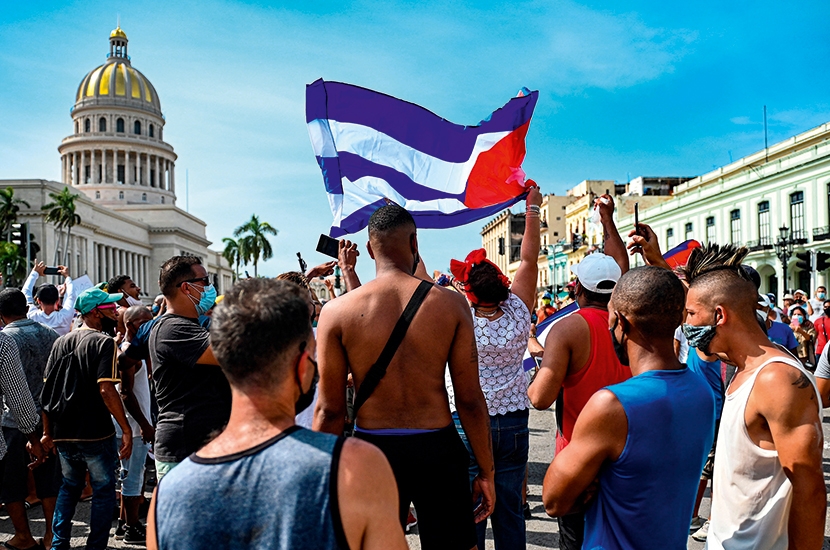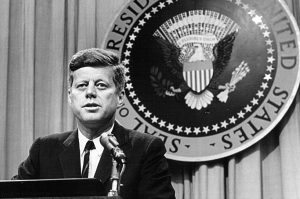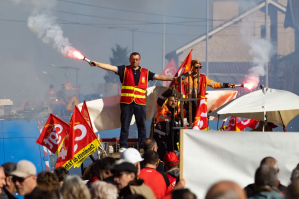Havana
There is an astonishing patience in the Cuban people, born of endless waiting. When a store has, say, chicken, people line up, often for days. But on Monday, outside the Zanja police station in central Havana, people weren’t waiting for food. They were waiting — patiently — for news of family members who had been arrested during unprecedented protests at the weekend.
The demonstrations flared like a petrol fire. Cubans had settled down for lunch, many preparing to watch the Euro 2020 final, when news spread of a march in the town of San Antonio de los Baños on the outskirts of Havana. Videos on social media showed people, driven to fury by daily, hours-long power cuts, chanting ‘libertad’ — freedom — or else ‘Patria y Vida’ — fatherland and life (a play on the bellicose revolutionary slogan Patria o Muerte — fatherland or death).
By half-time at Wembley, 4 p.m. here, the game was interrupted — as all Cuban television was — to show the furious president, Miguel Díaz-Canel, calling on government supporters — ‘all the revolutionaries, all the communists’ — to take to the streets and protect the country against protesters who had by then emerged the length and breadth of the 780-mile island.
By international standards, the protests were mild. Cars were overturned; bricks (of which there is no shortage to hand in this crumbling city) were thrown; a policeman was reported injured. In recent years Moscow, London, Santiago de Chile, Bogota, New York, Minneapolis and Hong Kong have seen far worse. But the impact should not be underestimated. This sort of thing just doesn’t happen in Cuba. The island is safe through a curious and amorphous combination of authoritarian rule and strong communitarian instincts, the ratio of which can be endlessly argued over. News of any sort of violent crime is very rare, and travels fast.
So thousands turning up on the streets chanting ‘no tenemos miedo’ — we are not afraid — is shocking. Until now, apart from a very small group of dissidents and artists, people have chosen either to believe, be patient, or leave. The last is often at appalling risk on rickety rafts on the Florida Straits or the walk to the US border across the Mexican desert.
The protests are due, in the main, to the consequences of the pandemic. Cuba’s economy contracted by 11 percent last year alone as tourism collapsed. The government has run out of foreign currency to pay its bills which, given it maintains a monopoly on importing all the food it can’t grow and the oil it can’t refine, has led to shortages, hunger and power cuts. Díaz-Canel blamed the 60-year-old United States embargo, calling it ‘economic asphyxiation’.
It would be easy, possibly even true, to say it was the young on the streets on Sunday. They certainly came out in numbers. Magazine editor Maykel González Vivero said he was stopped by police who accused him of throwing rocks and kicked his glasses away. On Twitter, he said he had seen Díaz-Canel speak on television: ‘He sounded very disconnected from Cubans’ economic and mental situations. That old speech sounds as bland as the Lord’s prayer.’
It’s only very recently that Cubans have had access to the mobile internet. I recall a photograph my friend Sarah posted on Instagram a couple of years ago, prior to the pandemic. It showed a line of young Cubans looking at their phones. ‘The new #Cuba,’ she wrote. ‘A year ago, you would never have seen Cubans glued to their phones at a party on Friday night. But then mobile internet arrived, with its benefits and downsides.’
Sarah was complaining because she likes to dance, and couldn’t get people away from their screens. But the Cuban government has impressive tools when social media is behaving in ways it doesn’t like. Since Sunday, it’s been almost impossible for people to get online. The lack of internet could be why, when I jumped on the back of my friend Alistair’s electric bike on Monday, the city had quietened. Where pitched battles had been fought, old men were cleaning the last debris from the streets. There were police on every corner, but the city wasn’t flooded with soldiers. However, state media did confirm that a man had died and others were injured in the Havana suburb of La Guinera that night.
The government line has been put most succinctly by Ramiro Valdés, the 89-year-old who fought his way to Havana in 1959 with the Castro brothers and who was, until earlier this year, Díaz-Canel’s deputy. He said the demonstrations, like the economic crisis, were the work of the United States, and the protesters were ‘delinquents in the service of empire, carrying out the instructions given by their owners’.
Yet to paint the situation as entirely young vs old is to be too broad-brush. In April, Granta published a second special issue dedicated to the best of young Spanish language novelists. It contains a story by Dainerys Machado that’s a brilliant combination of funny and incisive. Machado is 34 and in Florida finishing her PhD at the University of Miami.‘I think the phenomenon is generational, but it is at the same time much more complex,’ she said. She pointed out this is the second existential economic crisis to hit Cuba in 30 years. The first followed the collapse of the Soviet Union which, until 1989, had sponsored the island. ‘People living [in Cuba] have only lived their lives in cycles of economic precariousness and mirages of improvements,’ said Machado. ‘Those who were in their thirties during the 1990s had to take care of their children after the USSR collapsed, and now they have to take care of their nonagenarian parents while living in a similar state of misery to the one they survived in the 1990s. ‘The worst part is that these people survive all these crises without any hope of social change, while fulfilling the political commitments that the state requires of them, always having a little more patience, always making more “sacrifices”.’
As Tuesday dawned, there was increasing fury about the internet being shut down. For the moment it was less because people wanted to start new protests and more because friends and family hadn’t returned home. Amnesty International estimates that at least 140 Cubans have disappeared or been detained.
Some people managed to get online and posted messages like this one about Ariel Falcón: ‘He has been kidnapped and disappeared and they do not tell us or the family his location. He is in prison but none of them confirm anything.’ Families have been turning up at police stations, asking about the unheard from, and then waiting patiently.
It’s very difficult to tell what will happen over the next days, weeks and months — the undertows in this country remain hazy even to most Cubans. What is certain is that if life doesn’t get better soon, the pressure will build again. But next time the authorities will be ready.
On Sunday, Maykel González Vivero had sheltered from rocks under the arches of a building. ‘We were packed tight,’ he wrote afterwards. ‘Next to me an older woman in her sixties was wiping the blood from her nose. As she left she told one of the plainclothes policemen: “In the end you will have to recognize that people have rights.”’
This article was originally published in The Spectator’s UK magazine. Subscribe to the World edition here.


















